Civil society watch, 23-29 November
16 days of focusing on GBV loading
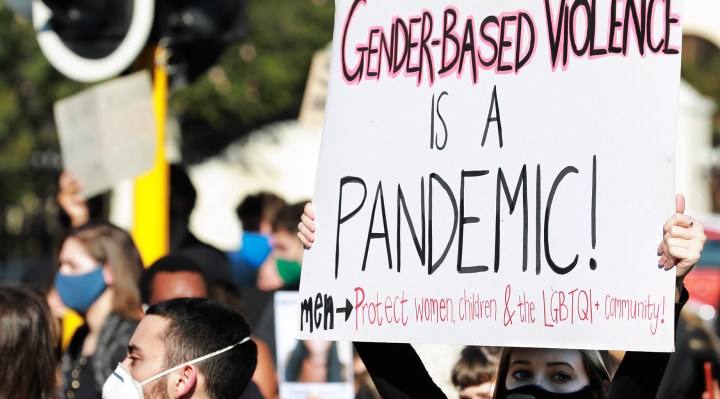
This week sees the start of 16 Days of Activism Against Gender-Based Violence and the marking of International Day for the Elimination of Violence against Women. These key events come as civil society turns its attention to corruption within the health sector, access to Covid-19 vaccines and transparency in municipal government.
Gender-based violence has long plagued our nation. However, since the outbreak of Covid-19, reports have shown that violence against women and girls, particularly domestic violence, has intensified.
Wednesday, 25 November, marks the start of this year’s 16 Days of Activism Against Gender-Based Violence – the same day we commemorate the International Day for the Elimination of Violence Against Women.
According to the United Nations, one in three women worldwide will experience physical or sexual violence – mostly by an intimate partner.
Violence against women and girls is one of the most widespread, persistent and devastating human rights violations.
To kick off activities over the next 16 days, at 10am on Wednesday, Lawyers for Human Rights and the Embassy of Ireland invite you to engage with an inter-disciplinary panel as they discuss Women’s access to justice – the law and its limits.
Through an intersectional lens, they will reflect on the state of access to justice for survivors of GBV in South Africa in 2020, and the barriers and opportunities to be found in our law.
The rest of the week…
At 10.30am on Monday, 23 November, the Hanns Seidel Foundation and the Catholic Parliamentary Liaison Office invite you to an online discussion on the 2021 local government elections.
The event will see Prof Tania Ajam (Stellenbosch University) and Prof Susan Booysen (Mapungubwe Institute for Strategic Reflection) review the findings of the most recent Auditor-General’s report which indicate that only 20 out of 278 municipalities received clean audits, and what this means for the local upcoming elections. Register here.
At 2pm the Climate Justice Charter Movement for South Africa is hosting a workshop on the Climate Justice Charter. The aim of the workshop is to provide an activist’s guide to what is meant by a “deep just transition”.
This guide will accompany the charter and serve as a tool for communities, workplaces and local governments to develop “deep just transition” plans and policies. Register here.
At 10am on Tuesday, 24 November, Oxfam South Africa launches its Inequality Report under the theme Reclaiming power: womxn’s work and income inequality in South Africa.
There will be two speakers joined by 10 panellists (see the poster below for details). Register for the event here.
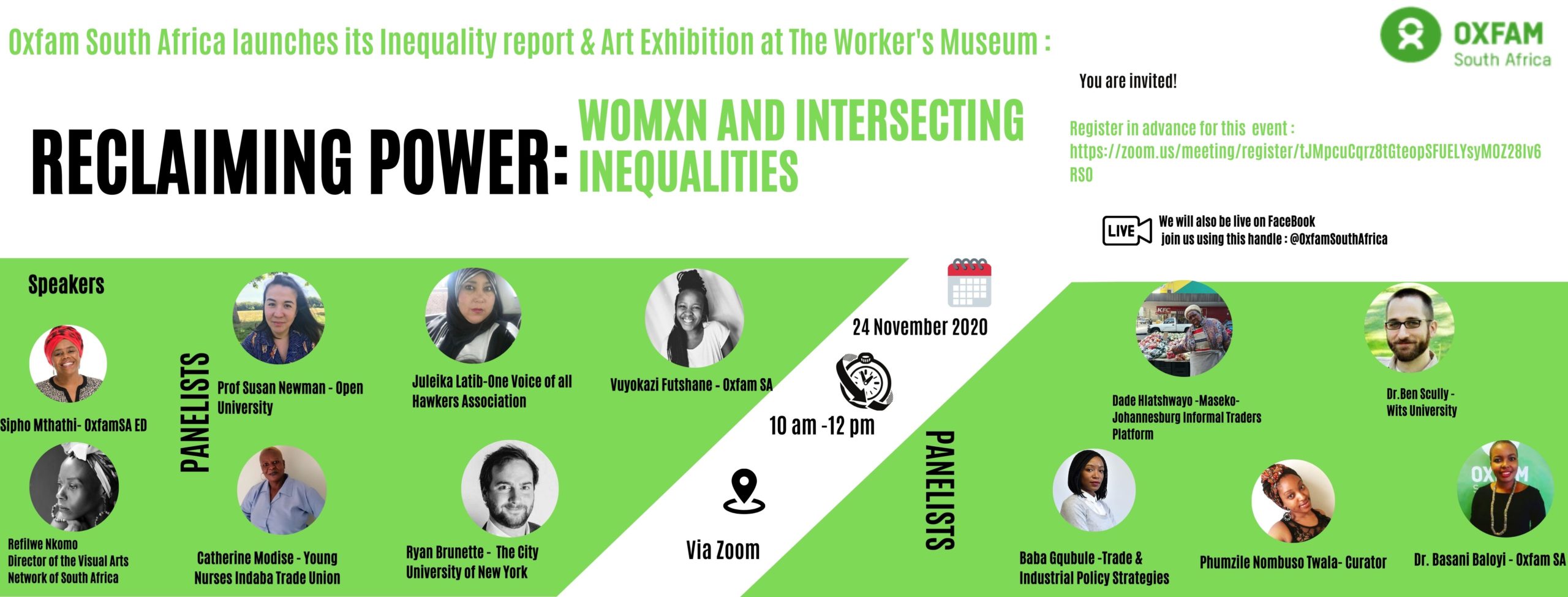
Last week the first-ever post-apartheid review of the social justice sector in South Africa was released. The study reviewed the sector from 1994 to 2020.
The Review, which was initiated and funded by the Raith Foundation, posed questions about the contribution of the sector to realising a post-apartheid vision for a just and equitable South Africa.
At 2pm, join the reports’ authors and the Raith Foundation for a webinar on critical reflections on the social justice sector in the post-apartheid era, where speakers will critically engage with the report. Register here.
At 2pm, Advancing Rights in Southern Africa (ARISA) invites you to a webinar to discuss the erosion of digital rights and freedom of expression in southern Africa, and the launch of the American Bar Association’s report on computer crimes and cybercrimes legal framework in the SADC region.
The webinar will be a platform to discuss the questions posed by the regional and national legal frameworks on computer crimes and cybercrimes, and lay the groundwork for the development of an advocacy campaign within SADC that seeks to protect the fundamental right to freedom of expression within the digital space. Join the webinar here.
Wednesday, 25 November, is going to be a busy day
In the morning, the annual Child Health Priorities conference starts and continues for two days. The conference draws together South Africa’s top paediatricians, researchers and civil society organisations working in child health. This year the focus will be on recovering child health after Covid-19.
At lunchtime, pop in to the Social Justice Cafe at 1pm for a digital cuppa and a hot political discussion.
The Social Justice Cafe is an initiative organised by Prof Thuli Madonsela as part of the M-Plan on Social Justice. According to Madonsela, “The aim of the café is to engage with young people on social justice issues and human rights-inspired democracy and action for inclusion”.
Discussions have taken place on topics such as social justice and feminism.
Wednesday’s discussion will be on Social Justice and Democracy and explore the value of democracy in the context of poverty and inequality.
Join Maverick Citizen Editor Mark Heywood, together with Neo Mokone (Black Lawyers Association, student chapter), Prof Bradley Slade (Stellenbosch University), and Allan Zinn (Centre for the Advancement of Non-Racialism and Democracy) as they debate these questions.
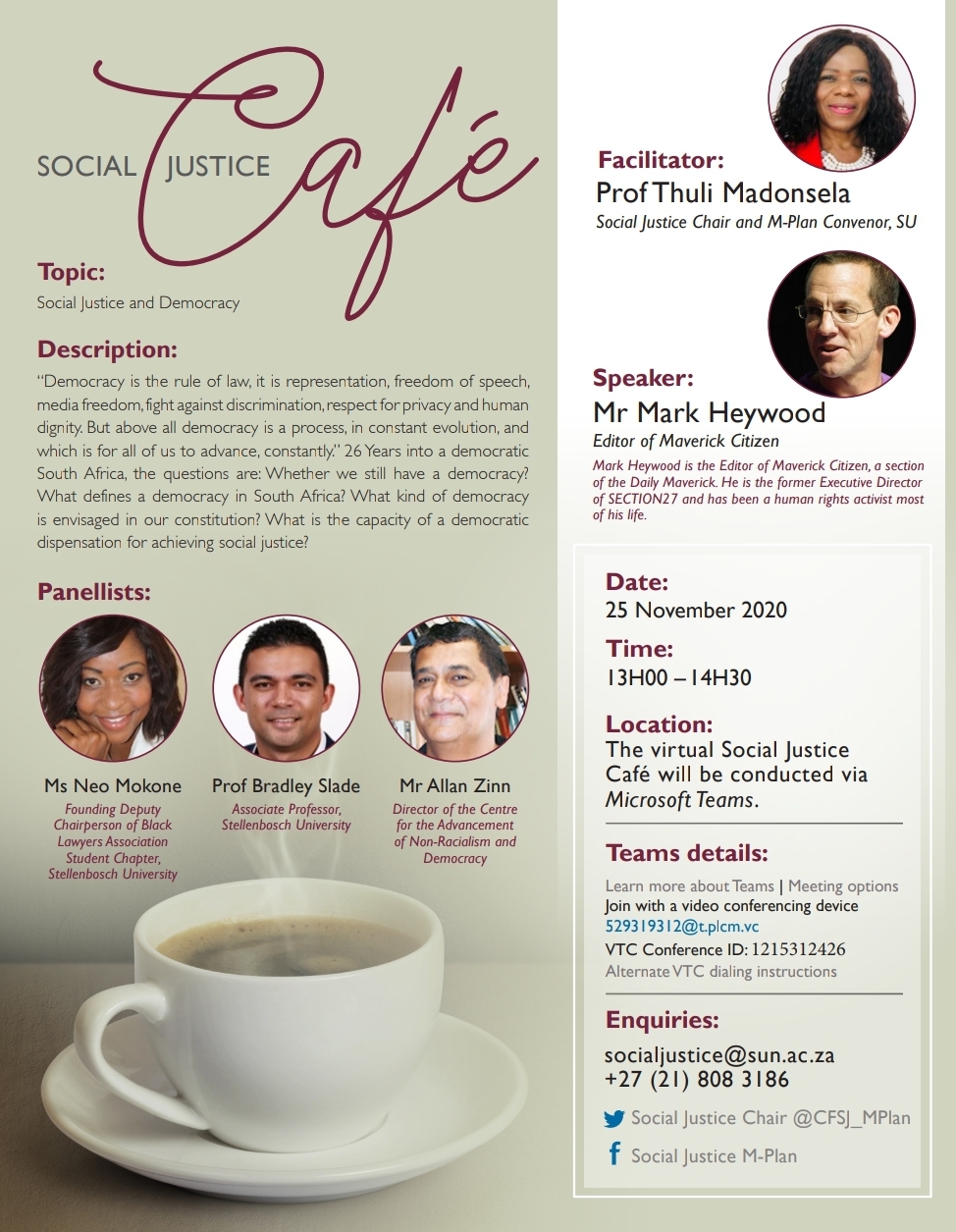 Also on Wednesday at 1pm, the University of the Witwatersrand will host its final webinar in a series of critical engagements titled Pandemic Pangolins: Systems, Science, and Society.
Also on Wednesday at 1pm, the University of the Witwatersrand will host its final webinar in a series of critical engagements titled Pandemic Pangolins: Systems, Science, and Society.
Wits is bringing together experts to debate and evaluate the ever-changing body of knowledge emerging from the Covid-19 pandemic. This week the series focuses on pandemic education in health sciences. Register here.
At 2pm the department of health, together with the United Nations Educational, Scientific and Cultural Organisation (UNESCO), will host a discussion on access and equity to Covid-19 vaccines.
Panellists include Prof Salim S. Abdool Karim (Ministerial Advisory Committee on Covid-19), Tian Johnson (the African Alliance), Jens Pedersen (Médecins Sans Frontières) and the UNESCO national bioethics committee. Register here.
At 3pm the South African Food Sovereignty Campaign will host its final workshop in a four-week series of agroecology workshops.
In this week’s workshop, John Nzira shares how to save seeds, while food activist Zayaan Khan speaks about reclaiming indigenous food and seeds. Register here.

At 3.30pm, the Nelson Mandela Foundation, the Land and Accountability Research Centre (LARC), and the Public Affairs Research Institute (PARI), in collaboration with the Hanns Seidel Foundation, invite you to a dialogue on The future of the Ingonyama Trust: substantive accountability in a post-Covid era.
The event will be facilitated by Dr Mbongiseni Buthelezi (PARI) and will see panellists Mavuso Mbhekiseni (Makhassaneni community), Zenande Booi (LARC), and Janet Bellamy (LARC) discuss the issues of the finances and financial management of the Ingonyama Trust’s assets, and whether these benefit the Trust’s beneficiaries, namely, “the members of the tribes and communities” living on land vested in the Trust, as is required by the legal framework governing the Trust. Register here.

On Wednesday and Thursday, the Child Health Priorities Association, together with UNICEF, is hosting the 11th child health priorities conference online. The theme this year is Putting children first! Covid-19: from response to recovery. Register here.
On Thursday, 26 November, the Southern Centre for Inequality Studies will host a discussion on Reimagining comprehensive social protection in the global South.
Drawing on four cases from the global South, speakers Prof Ravi Srivastava (Institute for Human Development), Thandiwe Matthews (Wits University), Prof Zerihun Berhane (Addis Ababa University) and Olivia Faite Izidine (National Institute for Social Action), will explore what it means to reimagine comprehensive social protection in states with limited capacity. Register here.
On Thursday and Friday, if you are in Cape Town, you are invited to head down to the Theatre Arts in Observatory to watch “an anti-fascist hip-hop musical” called uBumbano.
The collective attempts to speak through the violence of the global refugee crisis and xenophobic attacks in South Africa, and challenge the public to figure out productive community-building mechanisms from ubuntu. Book your tickets here.
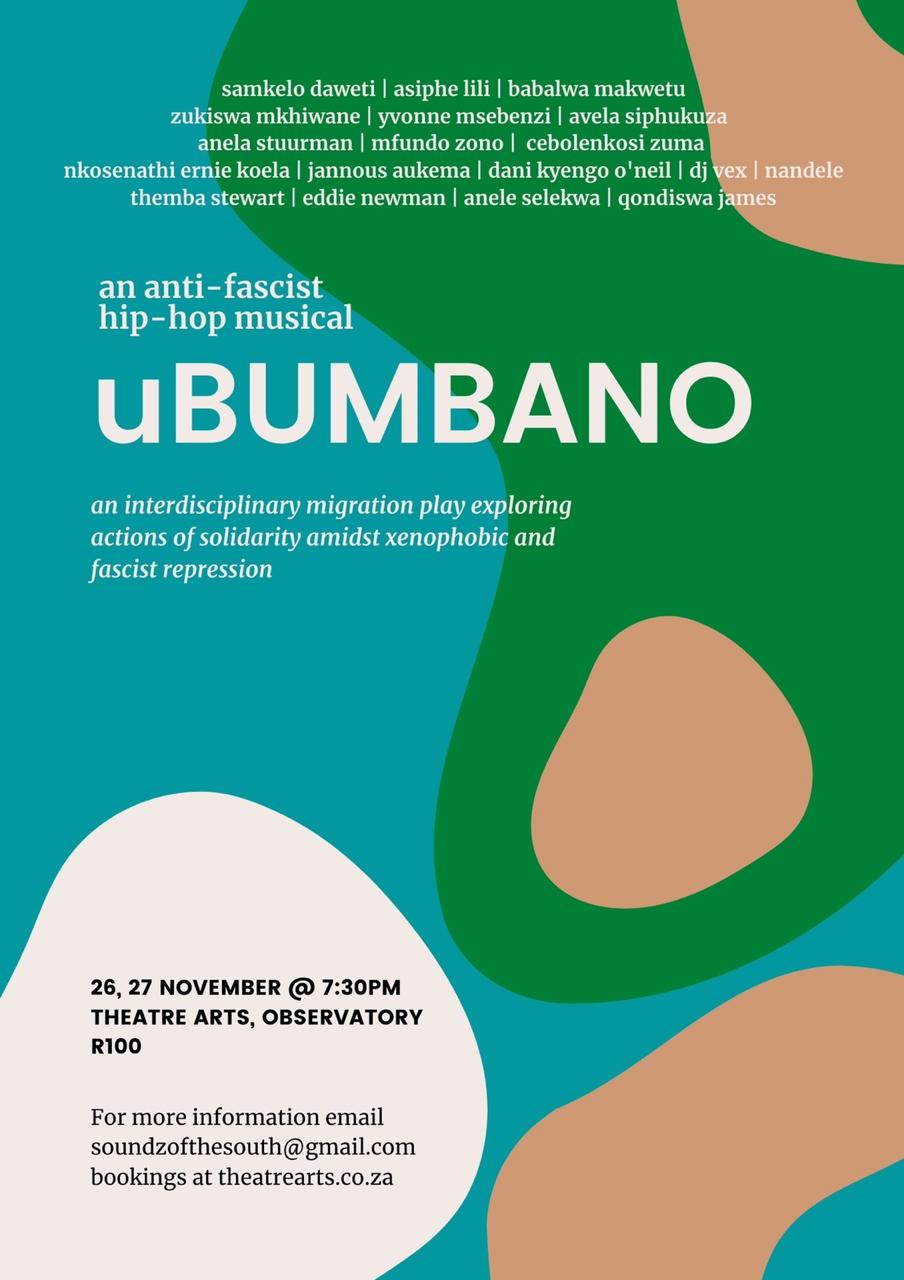
At 10am on Friday, 27 November, the Dullah Omar Institute (DOI), together with the International Budget Partnership South Africa, will launch a report on transparency in municipal procurement.
The launch will see numerous speakers interrogate the reports and discuss whether municipal websites are transparent about the goods and services that municipalities procure. Register here.
Sadly, corruption is rife in the health sector. And not just in this sector, either. On Sunday, 29 November at 6pm, the health sector anti-corruption forum (HSACF) is organising a webinar to highlight corruption in medical aid schemes, private hospitals and private care generally.
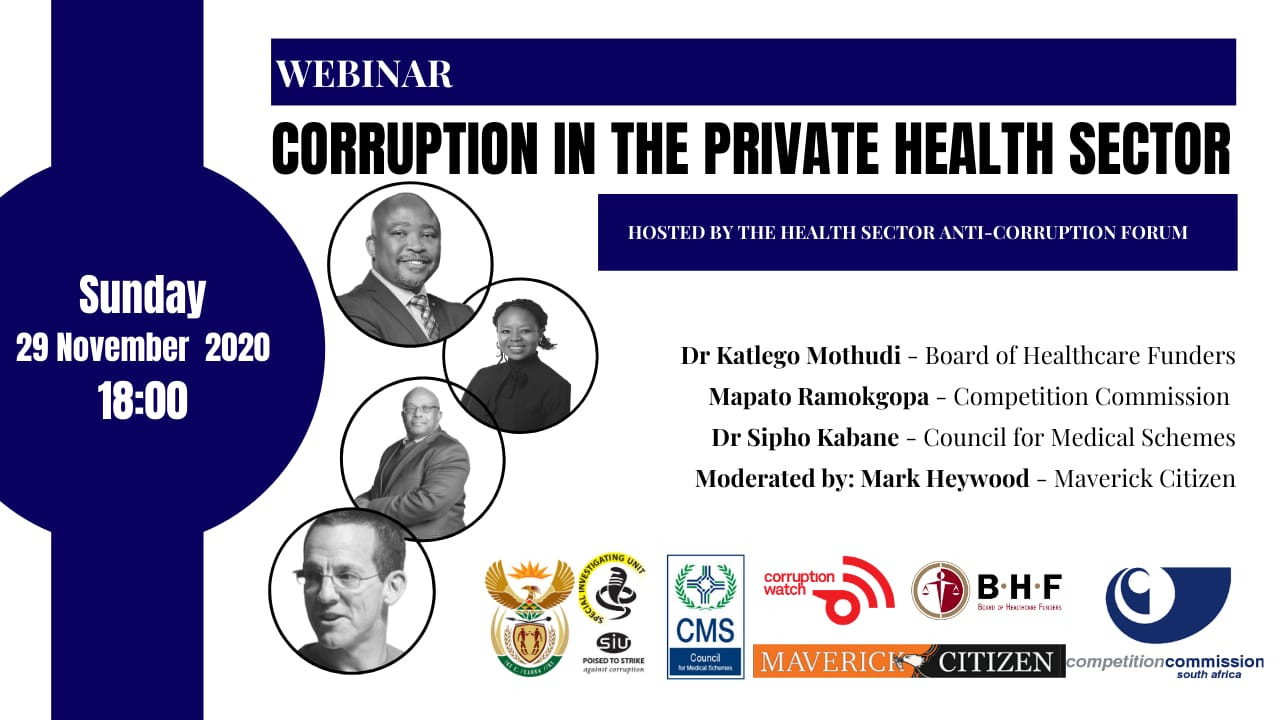
Join a high-profile line up to dissect the problem: Dr Katlego Mothudi (Board of Healthcare Funders), Mapato Ramokgopa (Competition Commission) and Dr Sipho Kabane (Council for Medical Schemes). Mark Heywood (Maverick Citizen) will moderate the discussion. Register here. DM/MC
South Africa is full of activists whose voices and campaigns need to be heard, and we want to report on all of them! So, wherever you live, if you have virtual events or meetings which you think other activists ought to know about, write to us at [email protected]
Like what you’re reading? Sign up to the Maverick Citizen newsletter and get a weekly round-up sent to your inbox every Tuesday. Free. Because paywalls should not stop you from being informed.
"Information pertaining to Covid-19, vaccines, how to control the spread of the virus and potential treatments is ever-changing. Under the South African Disaster Management Act Regulation 11(5)(c) it is prohibited to publish information through any medium with the intention to deceive people on government measures to address COVID-19. We are therefore disabling the comment section on this article in order to protect both the commenting member and ourselves from potential liability. Should you have additional information that you think we should know, please email [email protected]"





 Become an Insider
Become an Insider